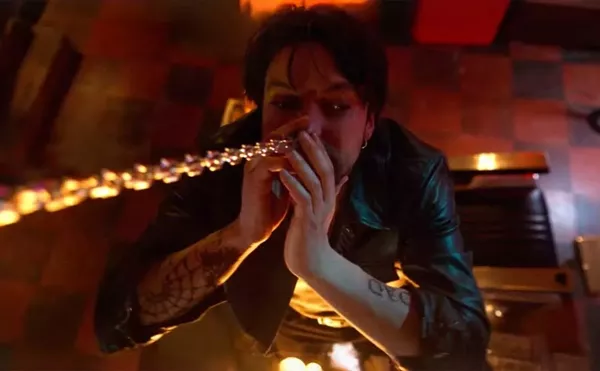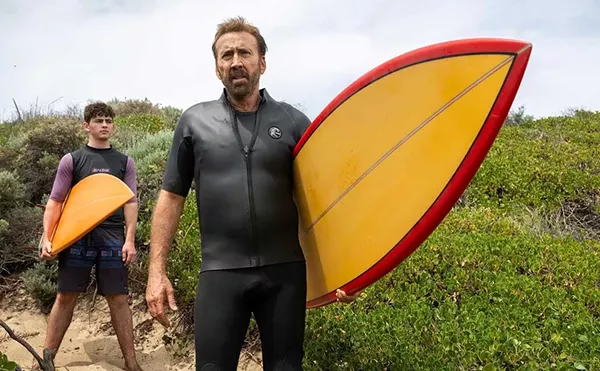
Audio By Carbonatix
[
{
"name": "GPT - Leaderboard - Inline - Content",
"component": "35519556",
"insertPoint": "5th",
"startingPoint": "3",
"requiredCountToDisplay": "3",
"maxInsertions": 100,
"adList": [
{
"adPreset": "LeaderboardInline"
}
]
}
]
A Nigerian immigrant working in London, Okwe drives a mini-cab by day and moonlights as a night porter in a seedy-swank hotel, the kind of place that might have been moderately plush at one time but is now dimly lit and disreputable. A doctor in his native country, Okwe’s professional life has descended from the medical to the menial and he’s now just another faceless foreigner working himself toward ill health in order to survive and, if he can save some money, escape. He’s also an illegal and a fugitive, having committed some crime back home which forced him to flee. As played by Chiwetel Ejiofor, an English-born stage actor who adopts the Nigerian accent of his parents for this role, Okwe radiates a sense of decency which, if he were not trying so hard to be a nonentity, would be charismatic. In any event, if there is some awful crime in his past, one becomes convinced that there must have been mitigating circumstances.
One night Okwe is informed by Juliette (Sophie Okonedo), a prostitute who uses the hotel to turn her tricks, that something’s wrong in one of the rooms upstairs. When he investigates he finds a toilet overflowing with bloody water; the object of blockage, which he carefully extracts, is a human heart. This, we soon learn, is the beginning of one aspect of the story, which concerns the black market trade in human kidneys, “donated” by immigrants who are then given new identities in the form of fake passports. The problem is that the people performing the operations aren’t professionals. The discarded heart turns out to be the byproduct of a botched operation, though how one could go for a kidney and end up extracting a heart isn’t explained, nor is the foolish attempt to flush it down a toilet.
Still, losing your heart in a cheesy hotel is a good metaphor, as is the idea of giving up an organ in order to pursue your miserable life with a minimum of official interference. Okwe, who can’t take the matter to the police for obvious reasons, confronts the night manager, who’s appropriately nicknamed Sneaky (Sergi Lopez) and who oversees the operations. Sneaky, aside from being a typically oily villain, has an interesting rationalization for what he does: The immigrants, he says, are happy to get the new identities and the recipients who would otherwise die are happy to get the fresh kidneys. He is, he says, in the business of making people happy. And if Okwe would just lend a professional hand, then everyone would be even happier.
Much suspense, then, is generated by this testing of Okwe’s virtue. He could simply walk away, but things are complicated by his relationship with a co-worker, a young Turkish woman named Senay (Audrey Tautou). Their relationship is platonic — he uses her couch to catch what little sleep he gets while she’s at work — but it’s on the verge of deepening. Senay is tough, naive and highly exploitable, and when Sneaky’s pressure on Okwe starts to coincide with her need for a new identity, the existential crunch is on. How far will he compromise his principles in order to save her, in this context of no hope?
Dirty Pretty Things is directed by Stephen Frears who, like a lot of good directors who don’t write their own screenplays, has had a variable career. After spending 15 years in British television, he made his feature debut with The Hit in 1984, which pitted a fatalistic code-of-honor gangster played by John Hurt against a superficial lowlife played by Terence Stamp. It was darkly comic and simply gritty as was, in a lighter way, his second feature My Beautiful Laundrette, a year later. Frears’ talent seemed to lie in his sensitivity to the ambiguity and shifting tones of his material.
His record since then has shown that he can’t transcend mediocre material like Hero (1992) but remains responsive when given something meaty to work with like The Grifters (1990). Dirty is a return to an earlier form, alternately funny, sordid, repulsive and romantic. And if at times it seems a bit contrived — I’m still wondering about that heart in the toilet — it remains a little gem of a film with an unexpectedly satisfying conclusion.
Showing exclusively at the Main Art Theatre (118 N. Main, Royal Oak). Call 248-542-0180.
Richard C. Walls writes about film for Metro Times. E-mail letters@metrotimes.com.





